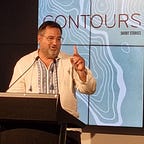On Realising That I’m Basically Stupid
With every day, two things get more prominent in my 58 year old life.
More stuff on my older body hurts. Most recently, after a bike crash, it’s a newly arthritic right thumb. It’s harder to open the jar of dill pickles.
The second thing is that, every day, I more realise how very little I actually know.
I recently did an audit of my own ignorance. I walked from my flat to my office which is about 500 metres through the central part of Parramatta. I looked at things and asked myself: do I know how that thing / process / technology etc actually works? How does it physically do what it does? How was it made?
The audit’s results are that I’m basically useless. I didn’t know any of the following (and many more) over that 10 minute stroll:
· how to build formwork to pour concrete;
· how traffic signals function;
· the process by which a coffee bean is grown, picked, processed, shipped and made into my daily coffee;
· how the lens in my spectacles are made and how they actually correct my vision;
· what type of trees have been planted along the new light rail route and why; and
· what goes on inside a computer chip.
In fact, I don’t need to consider epistemology, which is the study of the limits of knowledge. It’s redundant. Because I basically know jackshit about the world that I move through every day, including why the sun comes up and goes down every day. And yet somehow I not only survive, but in limited realms of human endeavour like politics, consulting and recycling, I’ve thrived from time to time.
It seems to me that, in modern society, many of us are pretty good fakers about knowledge. “Fake it ’til you make it” rings way too true for too many of us. Perhaps, that’s because — literally at our finger tips as I write this and as you read it — is technology that’s virtually God-like in its power and genius. With a few keyboard strokes, both you and I can manifest extraordinary amounts and types of information on every topic ever known to humanity.
And, it’s a digital delusion. The Internet fools us into thinking that we don’t actually need to know stuff because everything is within Google’s instantaneous reach. (By the way, I use Duck-Duck-Go to create some competition and get better privacy protection.) We risk replacing real expertise about topics with search engine shallowness.
I wonder if I am the only one who gets infuriated — and I know it’s pointless — at the proliferation of tribal views without validation which appears to be the mainstay of much social media. I know that it’s a way for people to cope with complexity, but the tendency toward intellectual ill-discipline and away from evidence bases worries me. I’ve always counted on somebody else knowing something and it’s scary to think the wise heads are fewer among us.
Many years ago, I met an older woman who was one of Sydney’s last remaining traditional bookbinders. In her studio, which felt a bit like a Hobbit house, she showed me through her ancient craft of selecting leathers, of colouring them, of imprinting words on them, and of weaving binding using ribbons or strings. I admired her collection of antique letterpress printing blocks, and she described the historical and literary context of each handmade and inky set.
Perhaps, she knew nothing at all about how to get somebody elected, or to organise an infantry squad into formation, or where to buy the best kielbasa in Sydney. Sure. But bookbinding and historical printing she knew deeply, both intellectually and emotionally. A total and real expert. In command of both the facts that describe and the passions that drive.
She was so impressive. I’m also always so impressed by my family members who can: rattle off the names of plants and flowers; truly understand the science of medical and health conditions; know how shin bones are connected to knee bones; read landscapes like they’re maps; put together financial models and plans; know all the lyrics to every 80s pop song; create organisational cultures; hunt down cyber criminals; design community-based mental health programs; navigate real estate law, or; manage mega-data. They are very cool — and make me hopeful.
Nevertheless, if a broader hollowing out of our commitment to knowledge worries me, how to personally productively proceed? Perhaps, I take up a challenge (and maybe you do too, my reader pal). In an age of capable generalists with easy access to instant information, I think I may swim against that tide and find mastery in a specific endeavour. It might be as simple as the ultimate way to take a walk in the park, or as complex as, say, recycling an e-bike battery.
But I do know this: it would be nice to really know something.
